
TL;DR: The six news items of note for me in Aotearoa-NZ’s political economy on Friday, April 5 included:
Just as the Government freezes infrastructure spending and grants to councils and slashes public R&D and science spending, ASB economists cite forecasts that Aotearoa-NZ faces an infrastructure bill of $1 trillion and call for cross-party consensus on user pays, along with more Government borrowing to pay for it. (See more detail and analysis below and in the podcast above)
Cabinet minister Matt Doocey was blindsided by his own Ministry’s proposal to close the Suicide Prevention Office to cut costs 7% so the Government can cut taxes. (See more detail and analysis below and in the podcast above)
Treasury’s Crown Accounts for the eight months to the end of February showed yesterday the Government’s deficit was just $115 million, which was $3.5 billion better than forecast in December and at odds with the Government’s rhetoric that it inherited a ‘fiscal train wreck.’
The Auckland Light Rail project office yesterday pre-emptively released its Briefing to the Incoming Minister (BIM), Simeon Brown, showing the project shut down by the Government in its first 100 days had a Benefit to Cost Ratio $2.40 to $1 of investment. That’s more than twice as productive as the 0.5 to 1.1 estimated BCR for the Mill Road project at Drury approved by the new Government, and the 1.3 estimated for the tolled Penlink motorway of Auckland. (Also, see chart of the day below)
ACT and NZ First’s dedication to culture war-ish policies continues to push away natural allies for National, with the Iwi Leaders Forum pulling out of a working group on racism after the Government said it wanted to talk less about institutional and colonial racism against Māori. (See more detail and analysis below and in the podcast above)
Simeon Brown announced the Government would legislate to force councils to hold binding referendums on Māori wards, which Local Government New Zealand described as “complete over-reach.”
(Paying subscribers can see more detail and analysis below the paywall and in the podcast above. We’ll open it up for public reading, listening and sharing if they give permission by getting over 100 likes.)
ASB wants tough political calls for $1 trillion task
ASB economists Mark Smith and Jordan Campbell cited forecasts in a research note published yesterday that Aotearoa-NZ faces an infrastructure bill of $1 trillion over the next 30 years. They called for more user pays and a “broad consensus over public funding options, including longer-term public debt limits/thresholds.”
They made the case for much more public investment to unleash growth in the private sector.
There is a good potential payoff. The US Policy Institute finds that each $100 spent on infrastructure boosts private sector output by 17% over the long run. ASB economists in a research note published yesterday.
New Zealand was at the bottom of the OECD on most measures, they argued, citing this World Competitiveness Centre estimate.
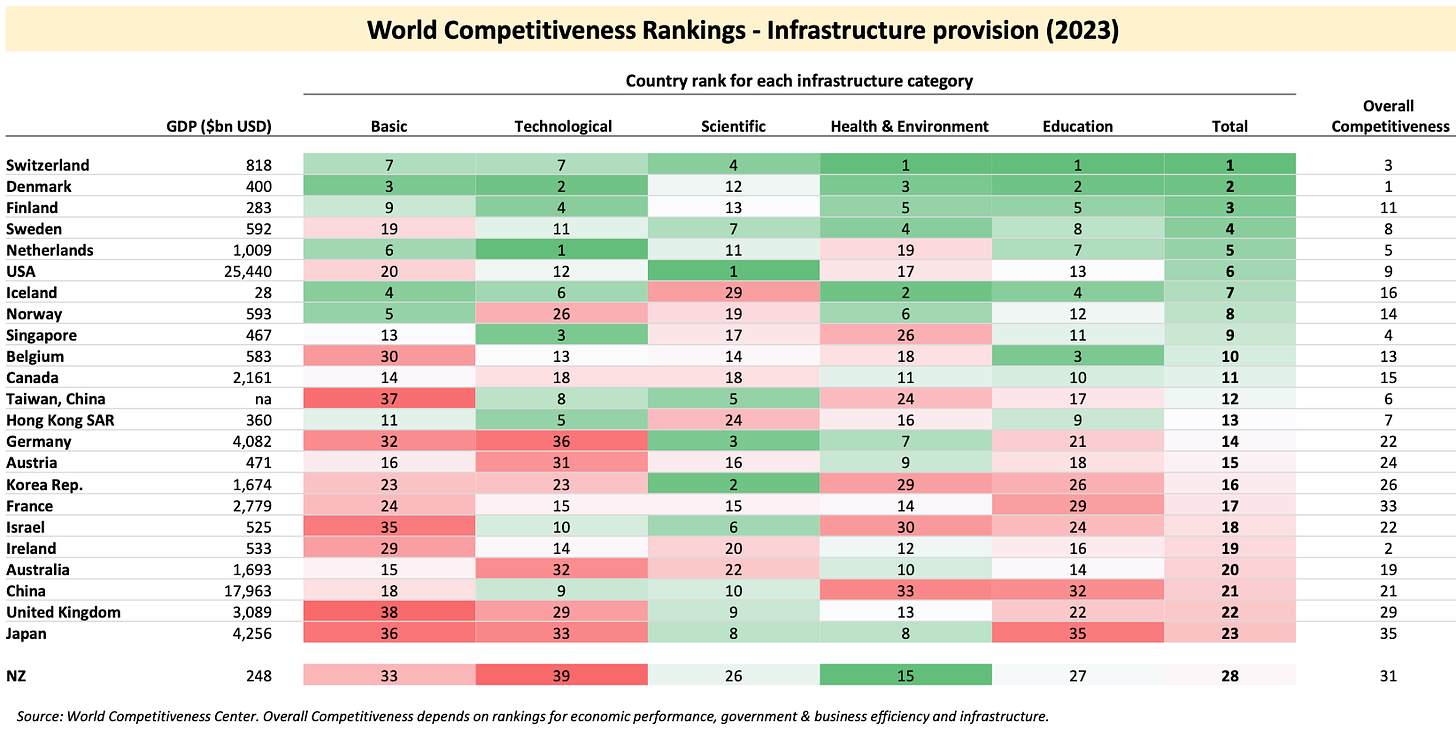
This low investment fed through into low productivity growth.
“It is not surprising that NZ’s poor productivity performance and lower living standards relative to most OECD peers has coincided with a period of lower infrastructure investment and R&D than the OECD average.” ASB economists in a research note published yesterday.
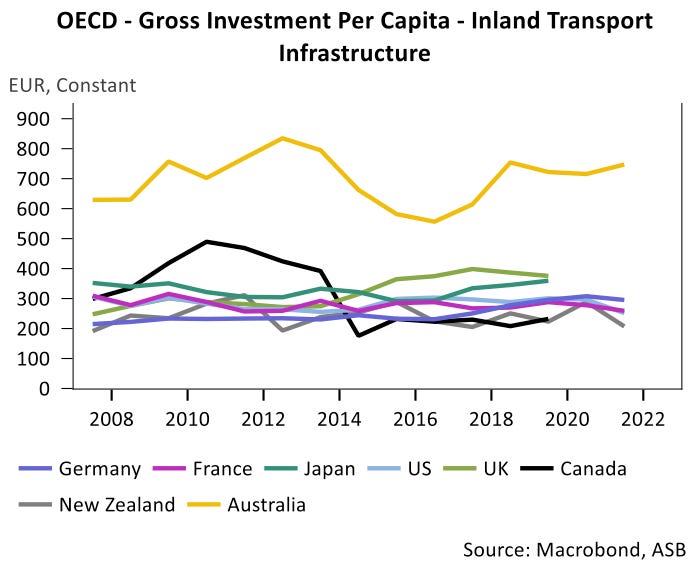
They make the point that voters and politicians will have to make tough decisions, and that much more than the current Government’s $7 billion per year is needed.
Sustaining higher infrastructure investment would require us to increase taxes, council rates, or user charges, while lower investment would require us to accept less or lower-quality infrastructure. ASB research note
Political consensus will be crucial, they say.
Frequent changes in government policy can add to political risk and significantly deter the willingness and ability of external parties to invest in projects. Broad political consensus is needed to advance infrastructure projects. ASB research note
And the Government should look at borrowing more itself, ASB says (bolding ASB’s).
NZ has a strong Crown balance sheet (about $190bn net worth) and comparatively low public debt (net core Crown debt of around 45% of GDP). The new fiscal rules provide for some flexibility over the short-term (move net core Crown debt towards 40% of GDP by 2028). However, longer-term objectives are for net core Crown debt to be held in a (lower) 20%–40% of GDP range, cognisant of longer-term pressures. While a lower debt range reduces the risks of an escalation in public debt to future shocks, it may mean that some productive investment opportunities could be forgone.
In my view, this is ASB’s economists saying the Government’s low-investment and low Government debt approach without political consensus won’t work.
Yes Minister, but No Minister
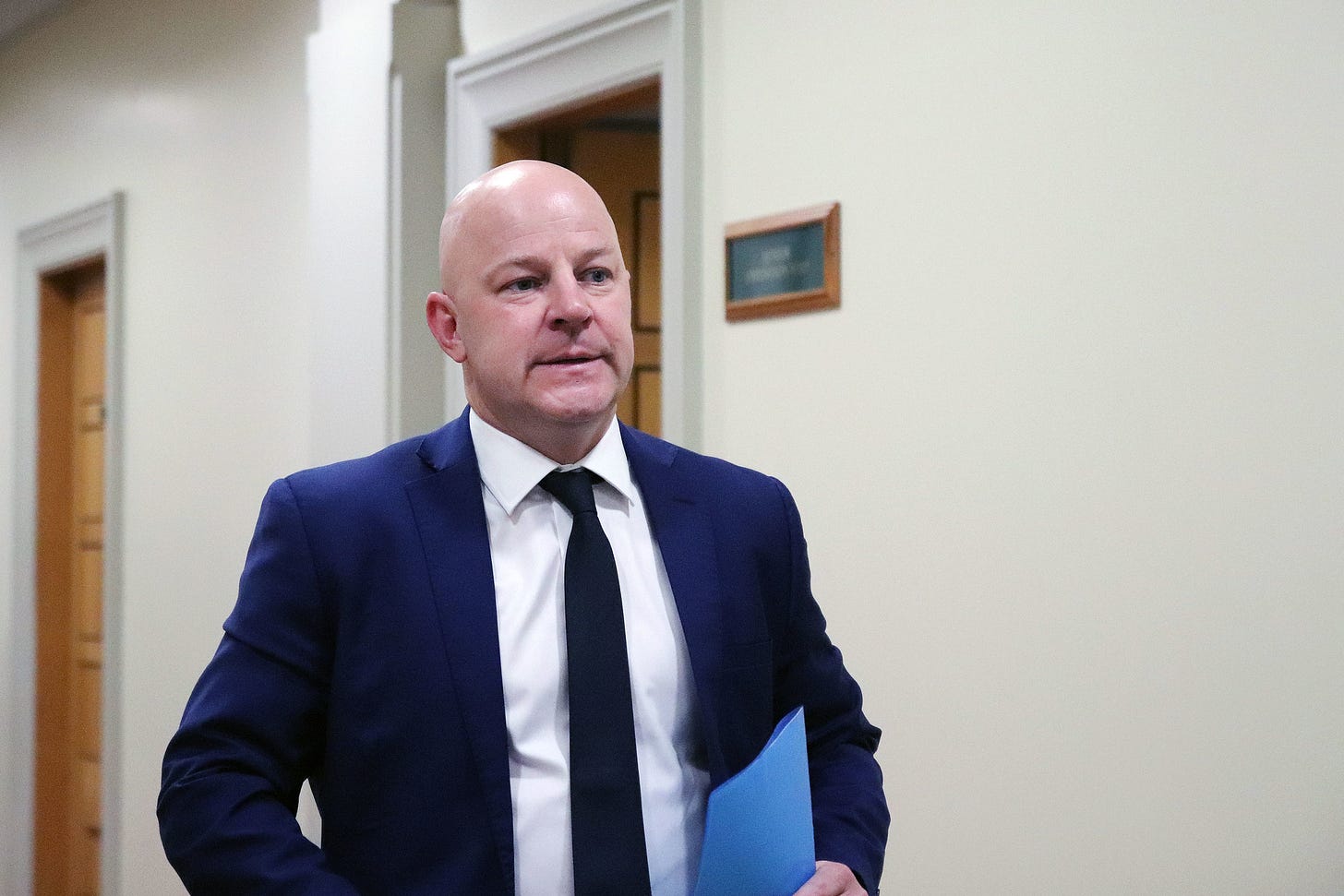
Indicative of the chaos unleashed by mandated 7% spending cuts for Budget 2024, the Suicide Prevention Office at the Ministry of Health could close if a proposal to axe more than 100 jobs goes ahead, a move that Minister for Mental Health in Cabinet Matt Doocey said he was not told about and did not want to see happen, Newshub’s Amelia Wade, Stuff’s Glenn McConnell and 1News’ Felix Desmarais reported last night.
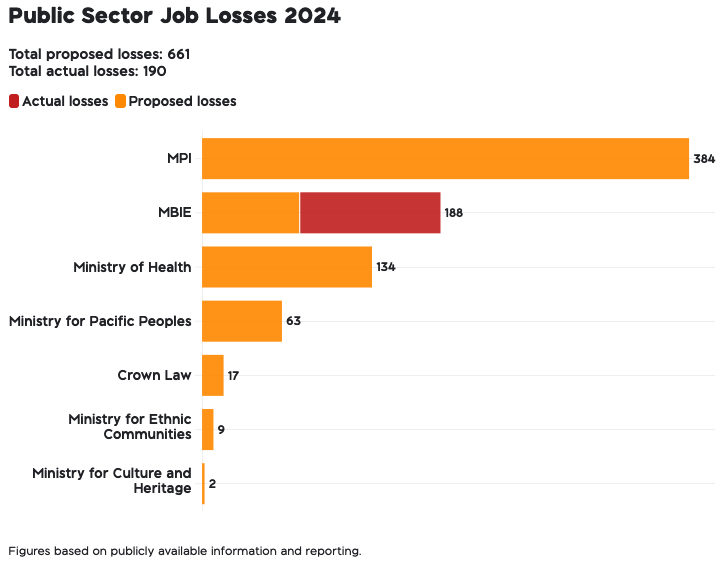
Not making friends, but influencing many
The Iwi Chairs Forum, a usually conservative grouping that often works with Governments of both flavours, took the unusual step yesterday of announcing it had pulled out the working group for a National Action Plan Against Racism, noting that the current government is “clearly committed to colonial racism and in particular, targeted racism against Māori”. Te Ao Māori News , RNZ , Newshub
“Our committee have met and collectively decided that we will not be moving forward with the government’s proposed plan amendments. We are not interested in providing this government with a tool that it will use to cloak its own racism, particularly the very targeted racism it is exhibiting towards Māori.
“The signalled shifts demonstrate not only the commitment of this government to maintaining colonial racism against Māori, but how important anti-Māori racism is to this government”. Tina Ngata, Tangata Whenua caucus member in Iwi Chairs Forum statement.
Chart of the day
A political choice
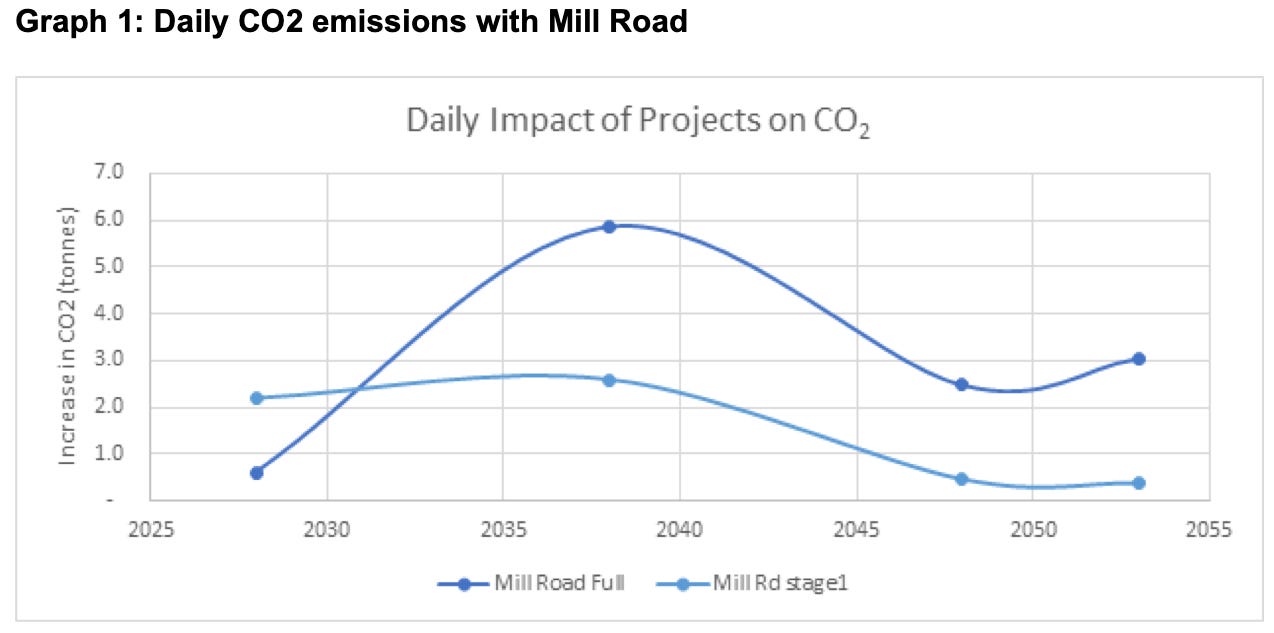
Cartoon of the day
A Wellington story
Timeline-cleansing nature pic of the day
Happy days
Today we farewell Rod Oram. He was a colleague and friend for Lynn and I. Please take some time today to read more of his work here at Newsroom. There is a livestream link to his memorial service starting today at 11 am.
Ka kite ano
Bernard




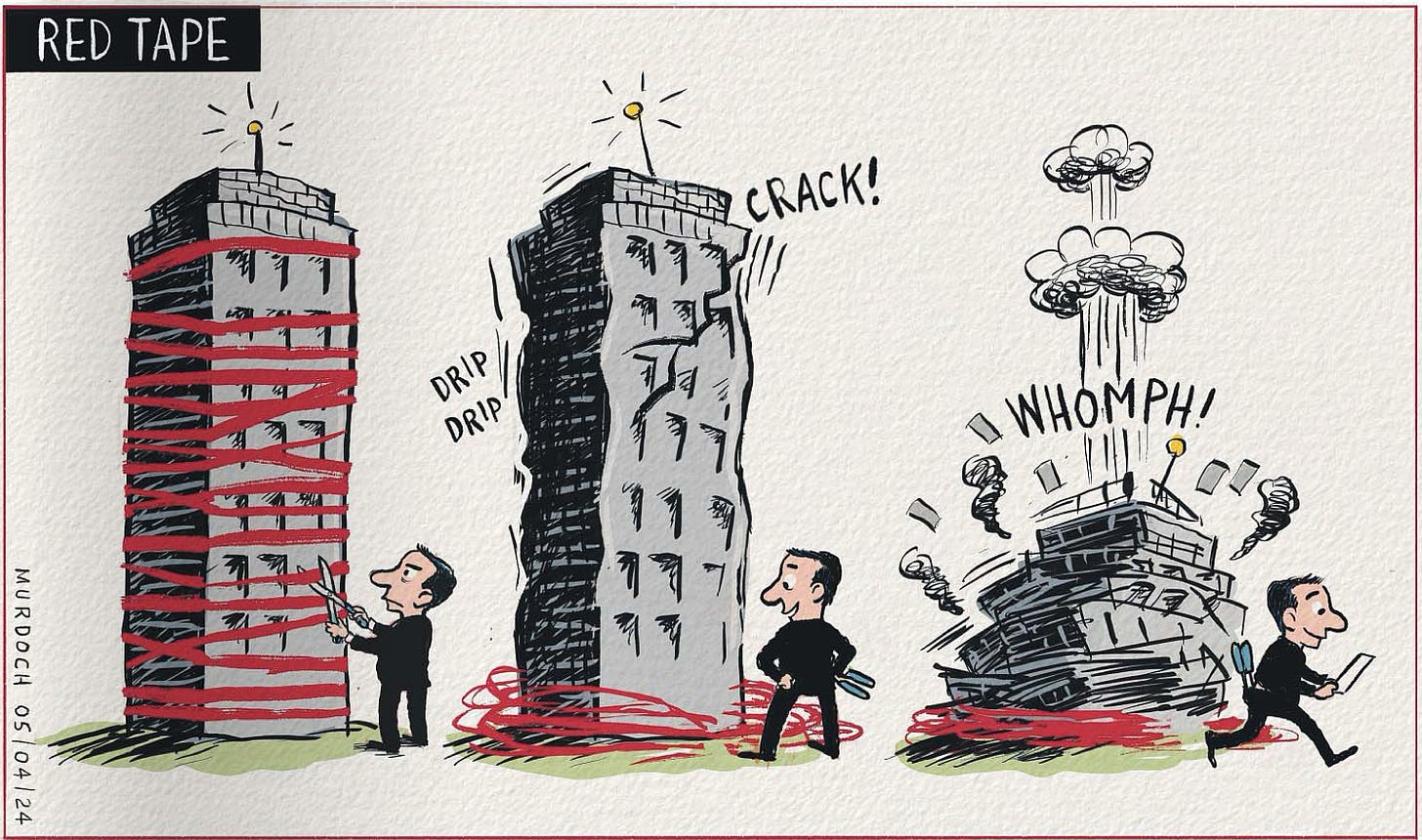













Dawn Chorus for Friday, April 5